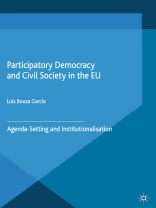This book is about both the symbolic and the real struggles for the control of the EU’s agenda on participatory democracy in the last fifteen years. The book analyzes how civil society organizations contributed to an agenda which has implications for the regulation of interest groups to the institutions and for the democratic legitimacy of the EU.
Inhoudsopgave
1. The Contribution of Civil Society to Bridging the Gap with EU Citizens: Back to One Decade of Debates 2. From the Regulation of Lobbies to Participatory Democracy: Agenda Setting and Civil Society in the EU 3. Interpretive Frames in the Agenda Setting Process, 1997-2003 4. Networking and Alliances 5. Organized Civil Society and the Convention’s Agenda 6. Influence on the Agenda and Field Effects 7. The Development of the Participatory Agenda in the Aftermath of the Convention (2003-2011): Consultation and Direct Participation 8. Assessing the Contribution of Participation to Legitimacy
Over de auteur
Luis Bouza García has a Ph D from the Robert Gordon University, UK. He coordinates European General Studies courses at the College of Europe, Belgium where he has worked previously as an Academic Assistant. He has also held research and teaching positions at the University of East Anglia, UK as well as the Universidad Carlos III, Spain and Spain’s National Institute for Public Administration.












